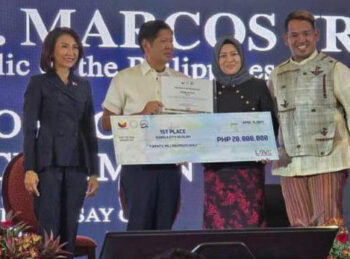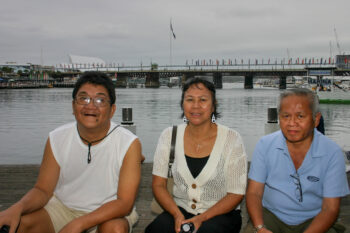And while in a public utility jeepney, I seldom hear these children of well-to-do families speaking these lines: “Where man ta mag-watch og movie?” or “Mommy, when man diay si Daddy mouli?” or “Mommy, ingon si teacher, bad baya ang mangaway og baby.”
From those who are in exclusive colleges and universities, these lines are quite familiar: “Mag-faster ta oy kay hapit na baya ang time!” or “Pa-borrow og money, please. Mo-pay ko tomorrow” or “Nag-eat naka?” or “Mag-buy tag food.”
What language is that? Certainly, it is neither English nor Cebuano.
Dr. Leoncio P. Deriada, of UP in the Visayas, said: “The greatest evil in the Philippine educational system is the use of English as the language of instruction in the classroom. The greatness of the Filipino is preserved in the various languages of the country.”
“We must teach in the language of the learner,” he urged writers, teachers and educators in his keynote speech during the 2005 National Conference of the Philippine Center for International PEN held in Iloilo City on December 3, even as he challenged them to master their own languages before they master another’s.
For his part, former UP President Francisco Nemenzo Jr. said: “Filipinos should not abandon their regional tongue but must also develop it.”
In his visit to Romblon, the first and only place he knew, NVM Gonzalez asked a faculty from the English department whether she enjoyed teaching English. The teacher replied: “I have no regrets, even though it’s a second language.”
Gonzalez retorted: “You have an English department and a Filipino department. But Tagalog is a second language and English a third. Don’t you want a Romblon department? Your language defines your world, including the history of our enslavement by the English.”
On one hand, Gonzalez had regrets that English became the official language of the Philippines. “The learning process could hardly be called slight; we had to do everything in a received language, every single word truly an alien presence,” he said, describing his difficult foray as a young writer using the “borrowed language.”
On the other hand, Dr. Macario Tiu, of Ateneo de Davao University, castigated those self-proclaimed pundits when they insist that students’ poor English is the culprit why most of the college graduates are jobless.
The solution to unemployment problem, according to Tiu and which I fully agree, is not to improve the ability of the students and graduates to speaking English but the opening of more businesses and industrial plants that will provide them jobs.
Speak English
I grew up in a remote village of Padre Burgos, Southern Leyte whose name rendered it more bucolic — Lungsodaan. The word “daan” means old in Cebuano. [Until now, as its name goes, our place remains “daan.”]
There, I studied in a public school for my elementary education and was forced to enroll in a private school for my secondary education because our place had — and until now, has — no public high school. Though I am 33 years old now, the order of our teachers directing us to speak in English is still very fresh in my memory. During those years, I, together with some of my classmates coming from poor families, religiously obeyed the order because we had no money to pay for the fine. Yes, our teachers would impose fines upon those caught speaking “Bisaya.” The result, many of us got the “Most Behaved” awards every closing of a school year!
In part, I can say that my teachers must have been good motivators because I have become an addict to English subjects in that I would listen to them attentively telling us the stories of Rip Van Winkle, King Arthur, Perseus, etc. or explaining when to use comma, semi colon and other punctuation marks.
Through their motivations, I learned to love the language, romanced it more deeply, and gave it the respect it richly deserves.
Truly, I can speak the English language but always stammer no matter how hard I have practiced it. And all along, I only mastered this line: “Ma’am, may I go out.” It was my favorite sentence in English while in high school.
Intelligence, progress
As I am a son of poor parents, I worked hard to earn a college degree — I finished a BA degree from a school in Cagayan de Oro, majoring in, accidentally, English.
In the campus, my classmates looked up to those who spoke English inside the classroom. But when I transcribed what they said, I found out that their English grammar was bad.
And I was much surprised later when I learned that those brandishing their supposed English-speaking expertise would always get the low scores during quizzes and examinations.
Yes, man’s intelligence is not measured through his ability to speak the English language fluently, much more his success in life.
Yes, our country’s progress is not measured through the people’s fluency to speak English.
Language of my birth
In my case, I love the language of my birth — Cebuano. The reason is simple: It is rich in words and terms that most appropriately describe certain events, occasions or activities.
For one, the Cebuano language has many terms for the English word “carry.” When you carry a thing using your hand, it is “bitbit”; pas-an, when using your shoulder; lukdo, when using your head; sung-ay, when using your nape.
So with the word “harvest.” When you harvest rice, it is ani; sanggi, when you harvest corn; tuba, when you harvest banana; guno, when you harvest mangoes; dugnas, when your harvest coconuts.
And so with the word “wash.” It is hunaw when you are washing your hands; himasa, when you are washing your feet; hilam-os when you are washing your face; ilo, when you are washing your anus!
And so on.
For another thing, I considered the Cebuano language as the foundation of my culture and existence. I will not abandon it wherever I may be. And because I am proud of it, I speak it most of the time in my daily routine.
As Prof. Madrileña dela Serna of UP Cebu bluntly puts it: “If we are good in Cebuano, we can be good in English.”
Mastering the native tongue
In the long list of Nobel Prize winners for literature, literary laureates coming from non-English speaking countries are writing in their own languages. So why concentrate on a borrowed tongue?
Once, an elementary grader schooled in an exclusive school asked in English her playmate enrolled in a public school. The playmate understood the question but answered in Cebuano. But the student from the exclusive school did not understand the answer and had to request the poor student to do some explaining. Now, the question: Between the two, who has appeared smart and intelligent? And who has appeared dull and brainless?
To me, learning, studying, speaking and writing in the English language is not bad. It helps. It’s a good decoration of our own being!
But, first thing first: We have to master our own language. Now!
It is an assurance that we will not get lost in the abyss of cultural diversity. Otherwise, we will exist without identity, like a gypsy in the ocean of uncertainties, floating aimlessly.
(Raul G. Moldez has been a fellow to the Iligan National Writers Workshop, the UP National Writers Workshop and the Panagsugat Creative Writing Workshop and is editorial assistant of Peryodiko Mindanao, a weekly newspaper in Cagayan de Oro City.)







